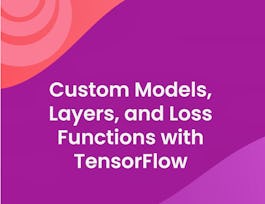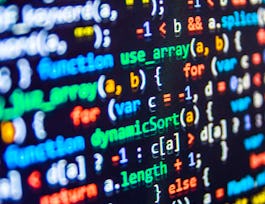PyTorch is one of the top 10 highest paid skills in tech (Indeed). As the use of PyTorch for neural networks rockets, professionals with PyTorch skills are in high demand. This course is ideal for AI engineers looking to gain job-ready skills in PyTorch that will catch the eye of an employer.



Introduction to Neural Networks and PyTorch
This course is part of multiple programs.

Instructor: Joseph Santarcangelo
Sponsored by Louisiana Workforce Commission
76,557 already enrolled
(1,746 reviews)
Recommended experience
What you'll learn
Job-ready PyTorch skills employers need in just 6 weeks
How to implement and train linear regression models from scratch using PyTorch’s functionalities
Key concepts of logistic regression and how to apply them to classification problems
How to handle data and train models using gradient descent for optimization
Details to know

Add to your LinkedIn profile
5 assignments
See how employees at top companies are mastering in-demand skills

Build your subject-matter expertise
- Learn new concepts from industry experts
- Gain a foundational understanding of a subject or tool
- Develop job-relevant skills with hands-on projects
- Earn a shareable career certificate from IBM


Earn a career certificate
Add this credential to your LinkedIn profile, resume, or CV
Share it on social media and in your performance review

There are 6 modules in this course
This module provides an overview of tensors and datasets. It will cover the appropriate methods to classify the type of data in a tensor and the type of tensor. You will learn the basics of 1D and 2-D tensors and the Numel method. Then you will learn to differentiate simple and partial derivatives. The module lists the different attributes that PyTorch uses in order to calculate a derivative. You will build a simple dataset class and object and a dataset for images. You will apply your learnings in labs and test your concepts in quizzes.
What's included
7 videos3 readings1 assignment6 app items3 plugins
This module describes linear regression. You will learn about classes, and how to build custom modules using nn.Modules to make predictions. Then you will explore the state_dict() method that returns a python dictionary. Then you will learn how to train the model, define a dataset and the noise assumption. You will further see how to minimize the cost and how to calculate loss using PyTorch. You will understand the Gradient Descent method and how to apply it on the cost function. You will learn to determine the bias and slope using the Gradient Descent method and define the cost surface. You will apply your learnings in labs and test your concepts in quizzes.
What's included
7 videos2 readings1 assignment3 app items2 plugins
This module covers implementing stochastic gradient descent using PyTorch’s data loader. Then you will explore batch processing techniques for efficient model training. You will compare Mini-Batch Gradient Descent and Stochastic Gradient Descent. Next, you will learn about Convergence Rate and using PyTorch’s optimization modules. Finally, you will learn the best practices for splitting data to ensure robust model evaluation and how hyperparameters are applied to train data. You will apply your learnings in labs and test your concepts in quizzes.
What's included
5 videos1 assignment4 app items1 plugin
In this module, you will learn to use the class linear to perform linear regression in multiple dimensions. In addition, you will learn about model parameters and how to calculate cost and perform gradient descent in PyTorch. You will learn to extend linear regression for multiple outputs. You will apply your learnings in labs and test your concepts in quizzes.
What's included
4 videos1 assignment4 app items
In this module, you will learn the fundamentals of linear classifiers and logistic regression. You will learn to use the nn.sequential model to build neural networks in PyTorch. You will implement logistic regression for prediction. The module also covers statistical concepts like Bernoulli Distribution and Maximum Likelihood Estimation underpinning logistic regression. In addition, you will understand and implement the cross entropy loss function. You will apply your learnings in labs and test your concepts in quizzes.
What's included
4 videos1 assignment3 app items
In this module, you will implement the final project applying all concepts learned. You will build a logistic regression model aimed at predicting the outcomes of League of Legends matches. Leveraging various in-game statistics, this project will utilize your knowledge of PyTorch, logistic regression, and data handling to create a robust predictive model.
What's included
2 readings1 peer review2 app items1 plugin
Instructor

Offered by
Why people choose Coursera for their career




Learner reviews
1,746 reviews
- 5 stars
65.61%
- 4 stars
21.73%
- 3 stars
6.12%
- 2 stars
3.71%
- 1 star
2.80%
Showing 3 of 1746
Reviewed on Jul 8, 2023
A well curated course filled with stuff essentially needed to acquire the knowledge of Deep Neural Networks with PyTorch and encompasses the domain of practical labs as well
Reviewed on Apr 29, 2020
An extremely good course for anyone starting to build deep learning models. I am very satisfied at the end of this course as i was able to code models easily using pytorch. Definitely recomended!!
Reviewed on Jul 26, 2020
Wonderful course!!! Best among all the courses under AI Engineer Certificate by IBM. Deep learning always haunted me with the maths involved but now I get a very good start with this.
Recommended if you're interested in Data Science

DeepLearning.AI

Arizona State University

Open new doors with Coursera Plus
Unlimited access to 10,000+ world-class courses, hands-on projects, and job-ready certificate programs - all included in your subscription
Advance your career with an online degree
Earn a degree from world-class universities - 100% online
Join over 3,400 global companies that choose Coursera for Business
Upskill your employees to excel in the digital economy




